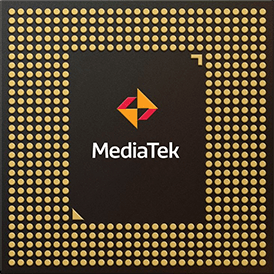
MediaTek Helio G99 Benchmark, Test and specs
Last updated:
The MediaTek Helio G99 is a 8 core processor. It can process 8 threads concurrently and is based on the 1. gen of the Mediatek Helio series. The processor was released in Q3/2022. The MediaTek Helio G99 scores 543 points with one CPU core in the Geekbench 5 benchmark. When using all CPU cores, the result is 1,814 points.

| Name: | MediaTek Helio G99 |
|---|---|
| Family: | Mediatek Helio (37) |
| CPU group: | MediaTek Helio G99 (1) |
| Architecture: | Cortex-A76 / Cortex-A55 |
| Segment: | Mobile |
| Generation: | 1 |
| Predecessor: | -- |
| Successor: | -- |
CPU Cores and Base Frequency
The 8 CPU cores of the MediaTek Helio G99 clock with 2.20 GHz. The number of CPU cores and the clock frequency of the processor are largely responsible for the overall performance.
| CPU Cores / Threads: | 8 / 8 |
|---|---|
| Core architecture: | hybrid (big.LITTLE) |
| A-Core: | 2x Cortex-A76 |
| B-Core: | 6x Cortex-A55 |
| Hyperthreading / SMT: | No |
|---|---|
| Overclocking: | No |
| A-Core Frequency: | 2.20 GHz |
| B-Core Frequency: | 2.00 GHz |
Artificial Intelligence and Machine Learning
Processors with the support of artificial intelligence (AI) and machine learning (ML) can process many calculations, especially audio, image and video processing, much faster than classic processors. Algorithms for ML improve their performance the more data they have collected via software. ML tasks can be processed up to 10,000 times faster than with a classic processor.
| AI hardware: | Mediatek APU |
|---|---|
| AI specifications: | MediaTek APU 2 @ 1 TOPS |
Internal Graphics
With the ARM Mali-G57 MP2, the MediaTek Helio G99 has an build in graphic solution. It has 2 SM processors, which have a total of 32 texture shaders. The iGPU not only enables games, but also significantly accelerates video playback.
| GPU name: | ARM Mali-G57 MP2 |
|---|---|
| GPU frequency: | 0.25 GHz |
| GPU (Turbo): | 1.07 GHz |
| Compute units: | 2 |
| Shader: | 32 |
| Hardware Raytracing: | No |
| Release date: | Q2/2020 |
| Max. displays: | 2 |
|---|---|
| Generation: | Vallhall 1 |
| Direct X: | 12 |
| Technology: | 7 nm |
| Max. GPU Memory: | 4 GB |
| Frame Generation: | No |
Hardware codec support
Processors that have an integrated graphics can play videos faster and more efficiently. This can have a positive effect on the battery life of notebooks, for example.
| h265 / HEVC (8 bit): | Decode / Encode |
|---|---|
| h265 / HEVC (10 bit): | Decode / Encode |
| h264: | Decode / Encode |
| VP8: | Decode / Encode |
| VP9: | Decode / Encode |
| AV1: | Decode |
|---|---|
| AVC: | Decode / Encode |
| VC-1: | Decode / Encode |
| JPEG: | Decode / Encode |
Memory & PCIeThe MediaTek Helio G99 supports up to 12 GB memory in up to 2 (Dual Channel) memory channels. This results in a maximum memory bandwidth of 34.1 GB/s. |
|
| Memory type: | Memory bandwidth: |
|---|---|
| LPDDR4X-4266 | 34.1 GB/s |
| Max. Memory: | 12 GB |
| Memory channels: | 2 (Dual Channel) |
| ECC: | No |
| PCIe: | |
| PCIe Bandwidth: | -- |
Thermal ManagementWith the TDP, the processor manufacturer specifies the cooling solution required for the processor. The MediaTek Helio G99 has a TDP of . |
|
|---|---|
| TDP (PL1 / PBP): | |
| TDP (PL2): | -- |
| TDP up: | -- |
| TDP down: | -- |
| Tjunction max.: | -- |
Technical details
The MediaTek Helio G99 has a 0.00 MB large cache. The processor is manufactured in 6 nm. Modern production increases the efficiency of the processor.
| Technology: | 6 nm |
|---|---|
| Chip design: | Chiplet |
| Socket: | -- |
| L2-Cache: | -- |
| L3-Cache: | -- |
| AES-NI: | No |
| Operating systems: | Android |
| Virtualization: | None |
|---|---|
| Instruction set (ISA): | Armv8-A (64 bit) |
| ISA extensions: | -- |
| Release date: | Q3/2022 |
| Release price: | -- |
| Part Number: | MT6789 |
| Documents: | Technical data sheet |
Rate this processor
Benchmark results

The benchmark results for the MediaTek Helio G99 have been carefully checked by us. We only publish benchmark results that have been created by us or that have been submitted by a visitor and then checked by a team member. All results are based on and fullfill our benchmark guidelines.
Geekbench 5, 64bit (Single-Core)
Geekbench 5 is a cross plattform benchmark that heavily uses the systems memory. A fast memory will push the result a lot. The single-core test only uses one CPU core, the amount of cores or hyperthreading ability doesn't count.

|
Intel Core i5-4250U
2C 4T @ 2.60 GHz |
||

|
AMD 3015Ce
2C 4T @ 2.30 GHz |
||

|
MediaTek Dimensity 700
8C 8T @ 2.20 GHz |
||
|
|
MediaTek Helio G99
8C 8T @ 2.20 GHz |
||

|
Intel Pentium Silver J5040
4C 4T @ 3.20 GHz |
||

|
MediaTek Dimensity 6020
8C 8T @ 2.20 GHz |
||

|
Qualcomm Snapdragon 480 Plus 5G
8C 8T @ 2.20 GHz |
||
Geekbench 5, 64bit (Multi-Core)
Geekbench 5 is a cross plattform benchmark that heavily uses the systems memory. A fast memory will push the result a lot. The multi-core test involves all CPU cores and taks a big advantage of hyperthreading.

|
AMD Athlon Gold 3150C
2C 4T @ 2.40 GHz |
||

|
AMD Athlon Gold 3150U
2C 4T @ 2.40 GHz |
||

|
Intel Pentium Gold G6400T
2C 4T @ 3.40 GHz |
||
|
|
MediaTek Helio G99
8C 8T @ 2.20 GHz |
||

|
MediaTek Helio G96
8C 8T @ 2.05 GHz |
||

|
MediaTek Dimensity 6080
8C 8T @ 2.40 GHz |
||

|
Intel Core i5-760
4C 4T @ 2.80 GHz |
||
Geekbench 6 (Single-Core)
Geekbench 6 is a benchmark for modern computers, notebooks and smartphones. What is new is an optimized utilization of newer CPU architectures, e.g. based on the big.LITTLE concept and combining CPU cores of different sizes. The single-core benchmark only evaluates the performance of the fastest CPU core, the number of CPU cores in a processor is irrelevant here.

|
Intel Core i7-3770T
4C 8T @ 3.70 GHz |
||

|
Intel Pentium G4400
2C 2T @ 3.30 GHz |
||

|
AMD EPYC 7281
16C 32T @ 2.70 GHz |
||
|
|
MediaTek Helio G99
8C 8T @ 2.20 GHz |
||

|
Intel Xeon E5-2690 v2
10C 20T @ 3.60 GHz |
||

|
MediaTek Dimensity 6020
8C 8T @ 2.20 GHz |
||

|
Intel Pentium G3450
2C 2T @ 3.40 GHz |
||
Geekbench 6 (Multi-Core)
Geekbench 6 is a benchmark for modern computers, notebooks and smartphones. What is new is an optimized utilization of newer CPU architectures, e.g. based on the big.LITTLE concept and combining CPU cores of different sizes. The multi-core benchmark evaluates the performance of all of the processor's CPU cores. Virtual thread improvements such as AMD SMT or Intel's Hyper-Threading have a positive impact on the benchmark result.

|
Intel Core i7-5650U
2C 4T @ 3.10 GHz |
||

|
Intel Core i3-6100H
2C 4T @ 2.70 GHz |
||

|
MediaTek Dimensity 800U
8C 8T @ 2.40 GHz |
||
|
|
MediaTek Helio G99
8C 8T @ 2.20 GHz |
||

|
Intel Core i5-4200M
2C 4T @ 3.10 GHz |
||

|
Intel Core i7-2760QM
4C 8T @ 2.40 GHz |
||

|
Intel Core i5-4278U
2C 4T @ 2.60 GHz |
||
iGPU - FP32 Performance (Single-precision GFLOPS)
The theoretical computing performance of the internal graphics unit of the processor with simple accuracy (32 bit) in GFLOPS. GFLOPS indicates how many billion floating point operations the iGPU can perform per second.

|
AMD A6-5350M
AMD Radeon HD 8450G @ 0.72 GHz |
||

|
AMD A6-5357M
AMD Radeon HD 8450G @ 0.72 GHz |
||

|
AMD A6-9220C
AMD Radeon R5 (Stoney Ridge) @ 0.72 GHz |
||
|
|
MediaTek Helio G99
ARM Mali-G57 MP2 @ 1.07 GHz |
||

|
Qualcomm Snapdragon 680 4G
Qualcomm Adreno 610 @ 0.00 GHz |
||

|
Qualcomm Snapdragon 665
Qualcomm Adreno 610 @ 0.00 GHz |
||

|
Qualcomm Snapdragon 662
Qualcomm Adreno 610 @ 0.00 GHz |
||
AnTuTu 9 Benchmark
The AnTuTu 9 benchmark is very well suited to measuring the performance of a smartphone. AnTuTu 9 is quite heavy on 3D graphics and can now also use the "Metal" graphics interface. In AnTuTu, memory and UX (user experience) are also tested by simulating browser and app usage. AnTuTu version 9 can compare any ARM CPU running on Android or iOS. Devices may not be directly comparable when benchmarked on different operating systems.
In the AnTuTu 9 benchmark, the single-core performance of a processor is only slightly weighted. The rating is made up of the multi-core performance of the processor, the speed of the working memory, and the performance of the internal graphics.
In the AnTuTu 9 benchmark, the single-core performance of a processor is only slightly weighted. The rating is made up of the multi-core performance of the processor, the speed of the working memory, and the performance of the internal graphics.

|
UNISOC T770
8C 8T @ 2.50 GHz |
||

|
Samsung Exynos 1280
8C 8T @ 2.40 GHz |
||

|
Qualcomm Snapdragon 750G
8C 8T @ 2.20 GHz |
||
|
|
MediaTek Helio G99
8C 8T @ 2.20 GHz |
||

|
MediaTek Dimensity 800U
8C 8T @ 2.40 GHz |
||

|
Qualcomm Snapdragon 765G
8C 8T @ 2.40 GHz |
||

|
Qualcomm Snapdragon 695 5G
8C 8T @ 2.20 GHz |
||
Estimated results for PassMark CPU Mark
Some of the CPUs listed below have been benchmarked by CPU-monkey. However the majority of CPUs have not been tested and the results have been estimated by a CPU-monkey’s secret proprietary formula. As such they do not accurately reflect the actual Passmark CPU mark values and are not endorsed by PassMark Software Pty Ltd.

|
Intel Core i7-7567U
2C 4T @ 3.90 GHz |
||

|
AMD Athlon 300GE
2C 4T @ 3.40 GHz |
||

|
Intel Core i3-1110G4
2C 4T @ 3.00 GHz |
||
|
|
MediaTek Helio G99
8C 8T @ 2.20 GHz |
||

|
Intel Core i5-3340
4C 4T @ 3.10 GHz |
||

|
AMD Phenom II X4 965
4C 4T @ 3.40 GHz |
||

|
AMD Phenom II X4 960T
4C 4T @ 3.40 GHz |
||
Performance for Artificial Intelligence (AI) and Machine Learning (ML)
Processors with the support of artificial intelligence (AI) and machine learning (ML) can process many calculations, especially audio, image and video processing, much faster than classic processors. The performance is given in the number (trillions) of arithmetic operations per second (TOPS).

|
Qualcomm Snapdragon 665
8C 8T @ 2.00 GHz |
||

|
Qualcomm Snapdragon 670
8C 8T @ 2.00 GHz |
||

|
Qualcomm Snapdragon 8cx
8C 8T @ 2.84 GHz |
||

|
Google Tensor
8C 8T @ 2.80 GHz |
||
|
|
MediaTek Helio G99
8C 8T @ 2.20 GHz |
||

|
Apple A11 Bionic
6C 6T @ 2.39 GHz |
||

|
MediaTek MT8183
8C 8T @ 2.00 GHz |
||
Benchmarks

Geekbench 5 (SC)
2,488 entries
2,488 entries

Geekbench 5 (MC)
2,461 entries
2,461 entries

Geekbench 6 (SC)
1,755 entries
1,755 entries

Geekbench 6 (MC)
1,703 entries
1,703 entries

FP32 SP (iGPU)
2,026 entries
2,026 entries

AnTuTu 9 Benchmark
90 entries
90 entries

PassMark CPU-Mark
2,392 entries
2,392 entries

AI / ML Performance
116 entries
116 entries
Description of the processor
The MediaTek Helio G99 is a processor that is mainly used in smartphones from various manufacturers. For example, the Motorola G72, which was released in the fourth quarter of 2022, is equipped with the processor, and the processor is also installed in the Gigaset GX4, which was released in the first quarter of 2023.The MediaTek Helio G99 has a total of 8 processor cores, which are divided into 2 performance cores and 6 efficiency cores. The performance cores are 2 Cortex-A76 cores, which have a maximum clock frequency of 2.20 gigahertz. The efficiency cores are 6 Cortex-A55 cores that clock at up to 2.00 gigahertz. This division into performance cores and efficiency cores is also called a hybrid core architecture.
The Mali G57 MP2 from ARM is used as the internal graphics unit in the MediaTek Helio G99. This iGPU has 2 execution units with 32 shader units and can use up to 4 GB of the system memory. The iGPU, which has a structure width of 7 nanometers, has a basic clock frequency of 250 megahertz, but this can be increased to up to 1.07 gigahertz in turbo mode. The graphics unit released in the fourth quarter of 2020 achieves an FP32 computing power of 274 GigaFLOPS, with single precision.
The graphics unit is able to decode and copy the video codecs H.264, H.265 (HEVC), VP8 and VP9 in hardware. The iGPU can at least decode the AV1 video codec.
With the MediaTek Helio G99, up to 12 gigabytes of LPDDR4X-4266 RAM can be operated via the 2 available memory channels.
The MediaTek Helio G99 is manufactured with a structure width of 6 nanometers and was launched in the third quarter of 2022. It is based on the ISA instruction set ARMv8-A64 (64 bit) and is manufactured in a chiplet chip design.
Popular comparisons
back to index





